 W
WEl Araucano was a biweekly newspaper published in Santiago, Chile from 1830 to 1877. Inspired by Interior Minister Diego Portales, it was an initiative of the conservative government to publish its laws and decrees. Due to government support, it never had funding problems.
 W
WCarabineros de Chile are the Chilean national law enforcement police, who have jurisdiction over the entire national territory of Chile. Created in 1927, their mission is to maintain order and create public respect for the laws of the country. They reported to the Ministerio de Defensa Nacional through the Undersecretary of Carabineros but since 2011, the Ministry of the Interior and Public Security has full control over them. They are in practice separated fully from the three other military branches by department but still considered part of the armed forces. Chile also has an investigative police force, the Investigations Police of Chile, also under the Interior and Public Security Ministry; a Maritime Police also exists for patrol of Chile's coastline.
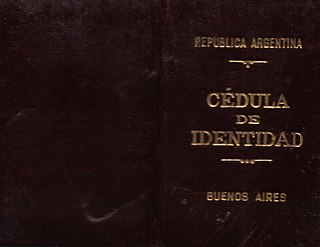 W
WCedula (Latin) means, in general, an order or authorization; in earlier times such a document on the authority of a king, or a royal decree, which for Spain and Spanish America was a decree issued directly by the monarch. A cedula may take the form of a brief authenticating text concerning an attached relic, such as the cedulae in reliquary pockets of the Ottonian Cross of Mathilde in the treasury of Essen Cathedral.
 W
WThe Central Bank of Chile is the central bank of Chile. It was originally created in 1925 and is incorporated into the current Chilean Constitution as an autonomous institution of constitutional rank. Its monetary policy is currently guided by an inflation targeting regime.
 W
WThe Chamber of Deputies is the lower house of Chile's bicameral Congress. Its organisation and its powers and duties are defined in articles 42 to 59 of Chile's current constitution.
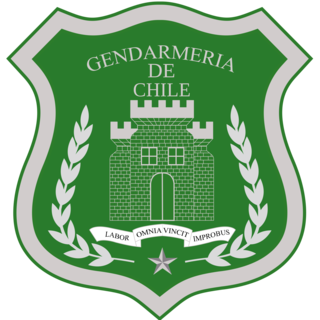 W
WThe Chilean Gendarmerie, in Spanish Gendarmería de Chile, is the title of Chile's uniformed national prison service. The title is historic, and the service is not an actual gendarmerie. The service evolved out of Chilean Army units which were given police and prison duties.
 W
WChilean passports are issued to citizens of Chile to facilitate international travel. Chilean passports are valid for worldwide travel and facilitate the access to consular services whilst abroad. They are issued by the Registro Civil e Identificación.
 W
WThe Civil Registry and Identification Service is the Chilean public service in charge of registering civil statuses of persons and other issues which, by law, it has to register.
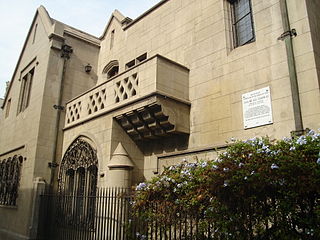 W
WThe National Monuments Council is a Chilean government agency dedicated to the preservation and upkeep of special natural and cultural sites in Chile. The National Monuments Council was created in 1925 by law Nº 17.288.
 W
WThe current Constitution of Chile was approved by Chilean voters in a controversial plebiscite on September 11, 1980, under the military dictatorship of Augusto Pinochet. It was partially enacted on March 11, 1981 and has been fully effective since March 11, 1990. It was amended considerably on August 17, 1989 and on 22 September 2005 (legislatively), and also in 1991, 1994, 1997, 1999, 2000, 2001, 2003, 2007, 2008, 2009, and 2010. It is Chile's eighth constitution, replacing the constitution of 1925. The Chilean people in the 2020 national plebiscite overwhelmingly voted to draft a new constitution. On October 25, 2020, a referendum was held which saw Chilean voters overwhelming approve 78% in favor of writing a new constitution by a convention. This draft constitution is to be approved or rejected by another popular vote referendum in 2022. A Constitutional Convention to write the new constitution was elected in May 2021.
 W
WThe Constitutional Court of Chile is Chile's constitutional tribunal. It is not part of the judicial branch and is functionally independent of the Congress and the President. The court is housed in the Ex Caja de Crédito Hipotecario building, which is located at 1234 Huérfanos Street in downtown Santiago.
 W
WThe Comptroller General of Chile is a constitutionally autonomous body of the Government of Chile based on chapter 10 of the Constitution of Chile and it is in charge of the control of the legal aspects, management, preaudit and postaudit functions of all the activities of the centralized and decentralized civil service, whatever its forms of organization may be, as well as of other powers granted by law.
 W
WThe Official Journal of the Republic of Chile is Chile's government gazette – a means of publication of laws, decrees, and other legal regulations issued by state bodies.
 W
WGovernment Assembly of the Kingdom of Chile, also known as the First Government Junta, was the organization established to rule Chile following the deposition and imprisonment of King Ferdinand VII by Napoleon Bonaparte. It was the earliest step in the Chilean struggle for independence, and the anniversary of its establishment is celebrated as the national day of Chile.
 W
WGovernment Junta of Chile, was the political structure established to rule Chile following the resignation of Supreme Director Bernardo O'Higgins. It ruled the country until April 4, 1823, when Ramón Freire assumed as the new Supreme Director.
 W
WThe Revolutionary Junta of Iquique, was the political structure that was established to challenge the power of Chilean President José Manuel Balmaceda after the navy insurrection that started the 1891 Chilean Civil War. The junta ruled the country until Admiral Jorge Montt assumed power as the new president after Balmaceda's defeat.
 W
WGovernment Junta of Chile, was the political structure established to rule Chile following the anti-conservative military coup that assumed power after first interfering in progressive President Arturo Alessandri's deadlocked government. It ruled the country until it was ousted by yet another military coup, and gave way to the January Junta.
 W
WGovernment Junta of Chile, was a political structure established during the anarchy that followed the resignation of President Carlos Ibáñez del Campo. The Socialist Republic of Chile ended with the election of Arturo Alessandri as new president of Chile.
 W
WThe judiciary of the Republic of Chile includes one Supreme Court, one Constitutional Court, 16 Courts of Appeal, 84 Oral Criminal Tribunals and Guarantee Judges; 7 Military Tribunals; over 300 Local Police Courts; and many other specialized Tribunals and courts in matter of family, labor, customs, taxes, electoral affairs, etc.
 W
WThis is a list of the Government Juntas that have ruled Chile as an executive government, since its independence:
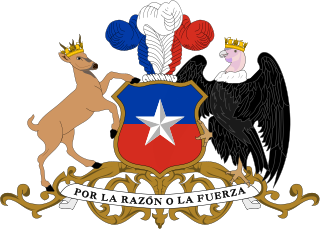 W
WThe National Congress of Chile is the legislative branch of the government of the Republic of Chile.
 W
WIn Chile, the O'Higgins Pioche is a piece regarded as the true symbol of presidential power, which is placed in the lower end of the presidential sash of office. The O'Higgins Pioche is a five-pointed star of about 7 cm in diameter, enameled in red.
 W
WThe Palace of Cerro Castillo is the official country retreat and summer residence of the President of Chile. Constructed in 1929 in the Spanish Colonial Revival style, it is located in Viña del Mar and is a national and municipal historic monument.
 W
WChile's government is a representative democratic republic, whereby the President of Chile is both head of state and head of government, and of a formal multi-party system. Executive power is exercised by the president and by his or her cabinet. Legislative power is vested in both the government and the two chambers of the National Congress. The judiciary is independent of the executive and the legislature of Chile.
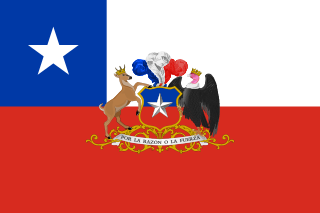 W
WThe president of Chile, officially known as the president of the Republic of Chile is the head of state and head of government of Chile. The president is responsible for both the Chilean government and state administration. Although its role and significance has changed over the history of Chile, as well as its position and relations with other actors in the national political organization, it is one of the most prominent political figures. It is also considered as one of the institutions that make up the "Historic Constitution of Chile", and is essential to the country's political stability.
 W
WThe Senate of the Republic of Chile is the upper house of Chile's bicameral National Congress, as established in the current Constitution of Chile.
 W
WThe Socialist Republic of Chile was a short-lived political entity in Chile, that was proclaimed by the Government Junta that took over that year.
 W
WStart-Up Chile is a seed accelerator created by the Chilean Government based in Santiago, Chile. It provides equity free investment for qualified startups.
 W
WThe Supreme Court of Chile is the highest court in Chile. It also administrates the lower courts in the nation. It is located in the capital Santiago.
 W
WVice president of Chile was a political position in Chile from 1826 to 1833.